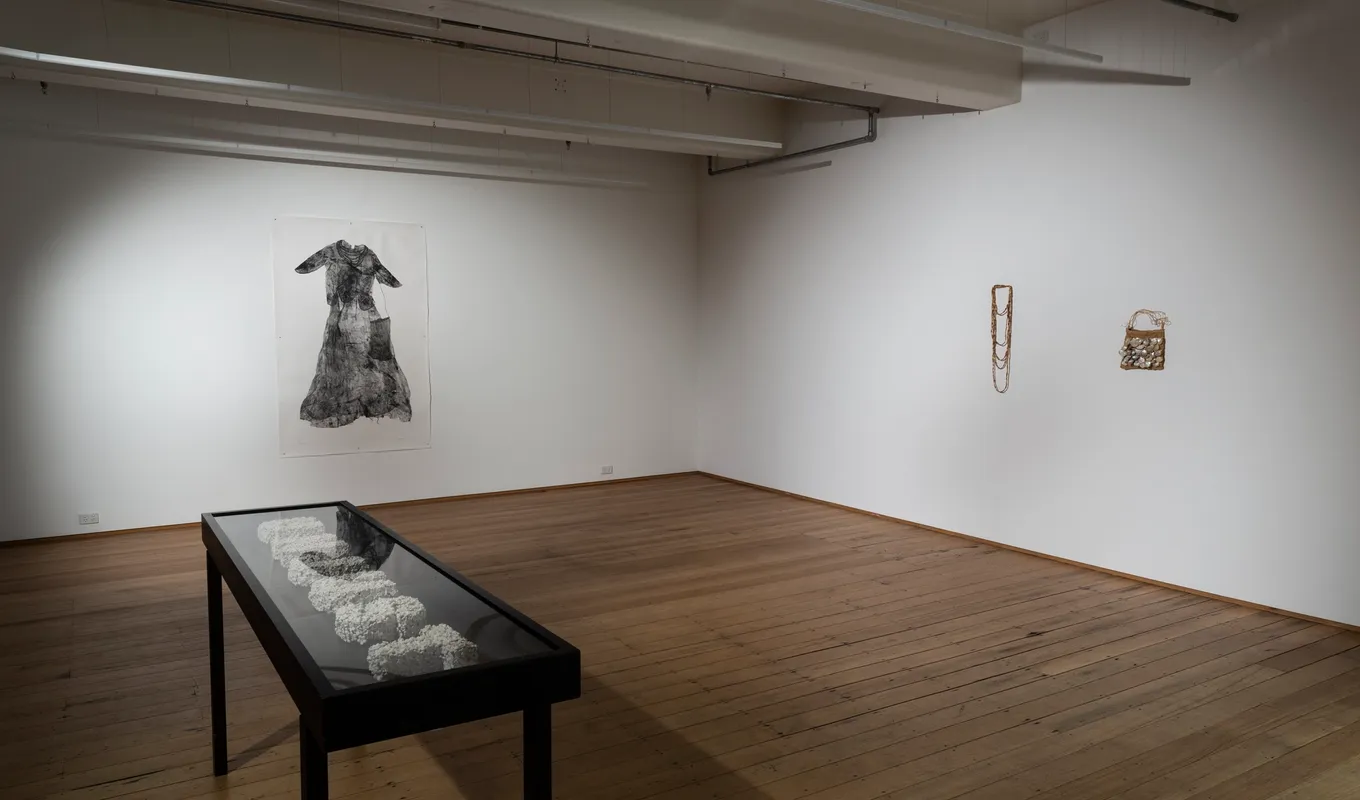Elijah Money
“Unravelling Rivals”
"Until the 1960s, Indigenous Australians could only marry with government permission. These garments and prints investigate long-lasting legacies of colonialism, asking questions such as how we remember and acknowledge these histories. My hope is to draw upon the strength of resistance by adapting, retaining cultural ways and identity." — Kyra Mancktelow
I am a Wiradjuri guest on the unceded sovereign lands of the Wurundjeri peoples of the Eastern Kulin Nations. This is where I live, work, and am writing from today. I am paying my respects to Elders both past and present. Wurundjeri mob and their forebears have been custodians of this land for millennia. I stand on the land which Aboriginal peoples have performed age-old ceremonies of celebration, initiation and renewal. I acknowledge the living culture and the unique roles in the life of the region. I recognise and respect this cultural heritage, the beliefs and relationship with the land; these continue to be central to the Kulin peoples of both past and today.

Wooden floorboards wedded with white walls greet us at West Space as we enter the solo exhibition of Quandamooka artist Kyra Mancktelow, titled Unconstitutional Love. Mancktelow sets wool-covered eyes ablaze, inviting viewers to continue interrogating privilege while exposing Blak1 truths. Shadows cradle the hosted artworks, encouraging eyes to divert and indulge in darkened divots. Here, hidden histories lay and threaten to reveal themselves, rattling fragile identities. While the space first presents neutral in tone with a strong emphasis on contrast, come closer, listen hard, the pieces will divulge some lustrous secrets.
Clear indicators of Mancktelow’s experience with printmaking are abundant throughout the entirety of the gallery. Walking into the space, the first artwork we encounter is a greyscale print of a dillybag, decorated with warm golden loops and gently resting atop what appears to be the original woven pattern. There is a delicateness to the intricate structure of the bag, worn and softened string hold open the mouth.
Facing one another, the bag lovingly gazes at a large print across the room of a wedding dress. By looking at it, one can see that the original dress was made of tarlatan, a fabric classically used within the printmaking industry to wipe the slate clean after use. This life-sized textile print mirrors the black ink and similar method used with the print of the dillybag. Feminine, flowery lace makes up the majority of the top half of the wedding dress, followed by the slowly, gently unravelling tarlatan stitches below.
Nearby, a glass box glistens as if making eyes to me across the room. My date welcomed me with a bouquet of a few hundred white flowers, spelling out the word ‘UNJUST’, their petite, pale petals graced with glistening golden centres. While passing through Mulgumpin (Moreton Island, Quandamooka Country, Queensland) Mancktelow couldn’t help but notice these bright flowers. Upon returning home, she later found out that they’re commonly referred to as wedding bush.

In considering the kinds of viewing habits prescribed by museums and galleries, one might perceive parallels between gallery visitors and the explorers of old; venturing into ‘uncharted’ territories in search of treasures ‘untold’. Setting afoot on ‘distant’ shores, gallery visitors embark upon a voyage of discovery, their senses heightened as they navigate the vast expanse of creative expression presented by Mancktelow.
Just as the colonial traveller ‘sought’ to understand the customs and cultures of ‘foreign�’ lands, so too must the art spectator strive to unravel the mysteries that lie within each visual artwork their eyes meet. No longer mere tourists in this realm of creativity but rather intrepid explorers; seeking to forge ‘connections’ with the ‘unknown’, to bridge the gap between artist and audience. Let us not forget the importance of context—a guiding thread that connects the past to the present, the individual to the collective. For every piece of material shares a story, every artwork is a product of its time and place, a reflection of the cultural currents that shape its creation.
Thus, armed with knowledge and curiosity, let the art spectator embark upon the voyage through the gallery, their senses attuned to the myriad textures that lay in wake.
Viewers must weave their way through the vulnerable and emotional labyrinth Kyra Mancktelow presents, inviting an internal, self-investigation of the viewer themselves. Removed from academic, anthropological practice, we each have the capacity to hold context. For mob, this exhibition could be a room of our own memories past; for non-Indigenous peoples it could be a space to hold the feeling of guilt associated with structural privilege. It is important to hold onto these questions beyond the space of the exhibition, in order to attend to repair like a needle and thread.
This exhibition holds space for artist Kyra Mancktelow to reflect on the colonial construct of institutionalised marriage, in particular, a homage to the marriage between her grandparents. It would be remiss to overlook that while these pieces speak directly to the artist's history, that this is a common tale that many mob relate to. These artworks, the bags, flowers, the dress; they’re not for any one woman, but a love letter addressing all of our matriarchs. Sharing in strength and resilience of the staunch women who have continued to raise us and raise their voices to common colonial understandings.
Dearly beloved, we are gathered here today to witness the love of maintaining prosperity despite legal obstruction through racial discrimination.
It’s my delight to announce to you, “Unconstitutional Love”.

This essay was commissioned by West Space.
Elijah Money is a Wiradjuri queer brotherboy who was raised on Kulin Nations where he continues to reside. He has a broad multidisciplinary creative practice which spans from visual art, writing, creative producer, workshop host, MC, drag queen and more. The political is personal and informs every facet of his practice that tends to be more self reflective of his experience as someone with a multifaceted identity. The foundations that ground his work is celebrating First Peoples queer joy.
